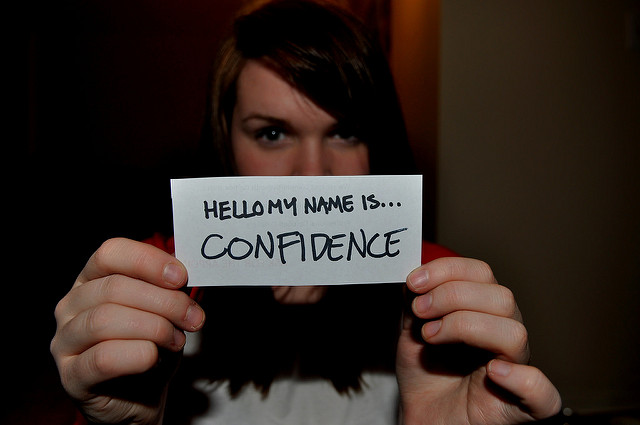Building Tomorrow’s Career Woman: Encouraging and Educating Young Women

So you’ve made it … or you are on your way. You’ve gotten the education, perfected the resume, honed the interviewing skills and finally landed the job! You’ve popped the bubbly and thought to yourself that this is the moment when you should feel a tremendous sense of accomplishment and pride.
And yet, you find yourself questioning your abilities and wondering if you actually belong in your new role. You’re continuously experiencing uncertainty and self-doubt as you wonder if you deserve the job that you have just earned.
Fortunately (or unfortunately) you are not alone in these thoughts. This lack of confidence – despite profound competence – impacts women throughout their lives. In fact, women are 6 times more likely than men to question their own abilities in the workplace. And to not believe that they are deserving enough for a job, promotion or raise.
Thoughts of inferiority and inadequacy
These disruptive thoughts of inferiority and inadequacy don’t begin when we enter the workforce. Rather they start when we are young and continue to plague us throughout our lives. My research with more than 10,000 girls across the United States revealed that by the time girls are in high school, nearly half don’t believe that they are smart enough for their dream job and 1 in 3 report staying away from leadership positions for fear that others will think they are bossy (The Girls’ Index, 2017).
So it is truly no surprise that by the time we are 20 (or 30 or 40!) we haven’t necessarily figured out how to own our intelligence, strength, abilities or competence. And while it is imperative that we continually attend to our own leadership development, we also have to simultaneously invest in the cultivation of the next generation of female leaders.
If we want to ensure equal representation of women in all sectors, we have to start preparing girls earlier. Much earlier. Like in elementary school.

Because from fifth to ninth grade girls’ confidence levels decline sharply and then do not rise again for the remainder of high school. During this time, girls can also lose faith in their abilities and begin opting out of opportunities that they don’t see as congruent with how they see themselves. This results in girls taking fewer chances as they progress through middle school and high school. They work hard to avoid failure or disappointment and, in doing so, can unintentionally hold themselves back.
This is not an issue of competence, rather it is a crisis of confidence.
We can make intentional efforts to build girls’ confidence as well as their perceptions of their own abilities. By investing in girls we are investing in a future that is more equitable, more diverse and more representative of the population. Here are some ways to get started:
Help cultivate girls’ confidence
By highlighting their skills, effort, work ethic, tenacity, creativity and curiosity – not by focusing on their appearance. We have been conditioned to compliment girls and women on how they look more than we accentuate who they are. The result of this is that girls’ then conflate confidence with looks and body image. When appearance-related feedback is the barometer of self-worth we collectively undermine the totality of an individual.

Create opportunities for girls and young women
Encourage them to try new things in a safe environment where they can be vulnerable and well supported. Let’s be honest, none of us like to fail. We especially avoid failure in places where we fear that we will be made fun of or criticized. However, trying new things is how we learn new skills. If we consistently feel like we may be judged or ridiculed, we will just stick to doing the things that we already know that we can do well rather than attempt something new.
Advocate for, support and fiercely defend other girls and women.
Girls learn from watching the people around them. When they observe you cheering on, supporting, mentoring and speaking positively about other females, they learn that girls are a source of support. If they hear degrading, demeaning or divisive comments they learn that girls are a source of competition.
Teach girls that their voice and opinion matter.
Half of girls report that they are afraid to speak their mind or disagree with others because they want to be liked. The result of this is that we are missing out on girls’ thoughts, ideas, creativity and contributions to the world. Fear of getting the answer wrong, being ridiculed or excluded are the top reasons that girls hold back sharing their thoughts and insights. Reward girls for having (and sharing!) their opinions.
Find opportunities to continue to build your own confidence
Role model self-acceptance and self-compassion for the younger women and girls in your life. The great thing about confidence is that it is not something that you are either born with or not. The same goes for leadership skills. Both are malleable and are able to be fostered with intentional focus and effort. When we demonstrate a willingness to learn while simultaneously modeling a growth mindset, we show girls that effort and improvement are more valuable than perfectionism.
Despite improvements, we still have a long way to go to increase the representation of females in most of the most prestigious and influential sectors of the workforce. Targeted efforts focused on what we can control and influence – which include what we tell ourselves and what we tell the girls who we parent, teach, mentor and supervise – provides an additional opportunity to change the face of leadership in our society.
Let’s ensure that girls today have every chance to figure this hard stuff out while they are young. So that by the time they make it to that dream job, they know that they earned it, that they deserve it and that they are going to completely rock it.
This guest post was authored by Dr. Lisa Hinkelman

Dr. Lisa Hinkelman, author of GIRLS WITHOUT LIMITS: Helping Girls Succeed In Relationships, Academics, Careers, And Life. She is an educator, counselor, researcher and author. Lisa has spent 15+ years researching girls and educating adults. She is the lead researcher behind the groundbreaking national survey, The Girls’ Index: New Insights Into the Complex World of Today’s Girls.
For more information, please visit https://RulingOurExperiences.com

